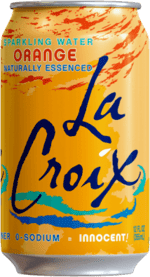La Croix Sparkling Water facts for kids
 |
|

355ml can of LaCroix Orange
|
|
| Type | Sparkling water |
|---|---|
| Manufacturer | National Beverage Corporation |
| Country of origin | La Crosse, Wisconsin, United States |
| Introduced | 1980 |
LaCroix (pronounced "lə-KROY") is a popular American brand of sparkling water. It started in La Crosse, Wisconsin, and is now sold by the National Beverage Corporation. LaCroix is known for its many different fruit flavors.
Contents
The Story of LaCroix Sparkling Water
How LaCroix Began
LaCroix was first introduced in February 1980 by the G. Heileman Brewing Company. This company was based in La Crosse, Wisconsin. LaCroix was one of the first brands to be seen as an "anti-Perrier" drink.
Perrier was a fancy sparkling water brand at the time. LaCroix wanted to be different. It aimed to be a sparkling water for everyone, for any time or occasion.
Growing Popularity and New Owners
For about ten years, LaCroix became very popular in the Midwest. By 1992, the brand was worth about $25 million. However, the original company, Heileman, was mostly known for beer. They decided to sell LaCroix.
In 1992, LaCroix was sold to National Beverage Corporation. At that time, National Beverage was known as Winterbrook.
A Fresh New Look
In 2002, National Beverage wanted to give LaCroix a new look. They tried out different designs for the cans. Interestingly, the design that company managers liked the least was a huge hit with customers.
Instead of simple designs, they chose a bold and colorful look. This bright design really appealed to their audience. This smart choice helped LaCroix become one of the top sparkling water brands.
Becoming a National Favorite
LaCroix was well-known in the Midwest since the early 1990s. Then, in 2015, something big happened. Sales of sugary sodas were dropping in the U.S. This was a chance for LaCroix to reach more people.
They started a big marketing campaign on social media. They specifically aimed at millennials, who are young adults. Sales quickly "exploded," and the brand gained a national "cult following." LaCroix became known as a healthier choice than sugary sodas. It also became popular as a mixer for drinks.
LaCroix Flavors
LaCroix offers many different flavors, often mixing fruits. Here are some of the flavors that have been released over the years:
| Base | Cúrate | NiCola | |
|---|---|---|---|
| 2004 | Pure (Unflavored)
Lemon Lime Cran-Raspberry (Razz-Cranberry) Orange Berry |
||
| 2008 | Pamplemousse (Grapefruit) | ||
| 2011 | Coconut | ||
| 2012 | Peach-Pear | ||
| 2014 | Apricot
Mango Passionfruit |
Cerise Limón
Pomme Bayá Piña Fraise |
|
| 2015 | Tangerine | Kiwi Sandia
Melón Pomelo Múre Pepino |
laCola
Cubana (discontinued) Cafe Cola (discontinued) |
| 2017 | Key Lime | ||
| 2019 | Coconut Cola
Cubana (Mojito) Coffea Exotica (Sumatra coffee and cola) |
||
| 2020 | Hi-Biscus!
LimonCello Pastèque (Watermelon) |
||
| 2021 | Beach Plum
Black Razzberry Guava São Paulo |
LaCroix's exact sales numbers are not made public. However, research shows that LaCroix is a leader in the sparkling water market in the United States. It holds about 30 percent of the market share. This is twice as much as its main competitor, Perrier.
 | Precious Adams |
 | Lauren Anderson |
 | Janet Collins |

